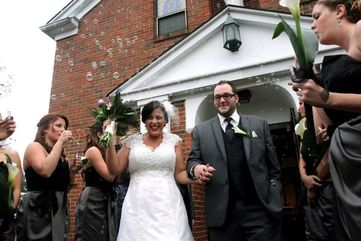|
Mr. & Mrs. Alexander Jennings
The matrimonial covenant, by which a man and a woman establish between themselves a partnership of the whole of life, is by its nature ordered toward the good of the spouses and the procreation and education of offspring; this covenant between baptized persons has been raised by Christ the Lord to the dignity of a sacrament.” (Catechism of the Catholic Church, 1601)
|
Marriage
|
Arrangements
Arrangements for weddings must be made by the parties to the proposed marriage by meeting with a priest at least one year in advance of the wedding. No wedding date will be scheduled until after your meeting with the priest. This will allow sufficient time for the couple to complete the required meetings, to attend the pre-marriage programs and to prepare a proper celebration of the sacrament.
Engaged couples should reserve the Church prior to scheduling the reception. Please call the Parish Office on Thursdays and Fridays to register.
Engaged couples should reserve the Church prior to scheduling the reception. Please call the Parish Office on Thursdays and Fridays to register.
Together For LifeTogether for Life has been the most trusted source for wedding planning in the Catholic Church for more than forty-five years.
Written by Msgr. Joseph Champlin (1930-2008) and first published in 1970, more than nine-million copies of Together for Life have been sold. The fifth edition was updated in 2011 with the help of Rev. Peter A. Jarret, C.S.C., to include the revised liturgical texts of the third edition of the Roman Missal. Each reading choice is accompanied by a reflection written by lay married theologians or pastoral leaders who are committed to the sacramental life of the church. |
|
Together for Life OnlineGetting married and staying married can be quite a challenge! Together for Life Online was developed as a community of engaged couples, married couples, and ministers to help build strong, life-long marriages with God.
At Together for Life Online, you will find:
|
Questions on Annulments
Often individuals are not fully participating in the life of the church because of divorce and remarriage. Others, civilly divorced, have questions regarding the previous marriage.
If anyone who is divorced and would like to learn more about the annulment process can contact the Parish Office or the Diocesan Tribunal.
If anyone who is divorced and would like to learn more about the annulment process can contact the Parish Office or the Diocesan Tribunal.
Are divorced people excommunicated from the Catholic Church? |
No. Divorced people are full members of the Church and are encouraged to participate in its activities.
|
May a divorced Catholic receive Holy Communion?
|
Yes. Divorced Catholics in good standing with the Church, who have not remarried or who have remarried following an annulment, may receive the sacraments.
|
What is an Annulment? |
An annulment is not a Church divorce. Annulment and divorce are two entirely different entities. Each has a different process, different grounds, and a different focus; consequently, each one has different effects.
A civil divorce declares that a marriage did occur but, for some reason the marriage is no longer a civil entity. Often there is a blame attributed, such as adultery, mental cruelty, abandonment, and so forth. Simple incompatibility between husband and wife after thirty years of marriage would also qualify as a ground for divorce. The focus of a civil divorce is either what had occurred during the marriage, or that the parties simply no longer wish to be married. As a result of the civil divorce process, the parties who had once been married are now declared by the State as no longer married. A church annulment also declares that a marriage did occur, but for a particular and proven reason, was not binding. There is no blame attributed to either party since the grounds established would be solely to determine the basis upon which the marriage lacked validity at the time it was contracted. Canonical grounds for an annulment are entirely different from civil grounds for a divorce. |
The focus of the annulment process is not the marriage but the actual contractants of the marriage and the relationship of each to the other at the time they gave their consent to marry. |
A civil divorce concerns the circumstances of a marriage. A Church annulment concerns the circumstances of the relationship of the parties who had given their consent to enter that marriage. Only when a clear and accurate picture of the courtship and early years of the marriage has been established could there be a possibility of establishing grounds upon which the case can proceed to a definitive conclusion.
-Diocese of Camden Tribunal |
If you have questions about the annulment process, please contact the Parish Office or the Diocesan Tribunal
|
Parish Office
81 Cooper Street Woodbury, NJ Phone 856-845-0123 Office Hours: 9:00am - 4:00pm Monday-Friday Summer Hours: 9:00am-3:00pm Monday-Friday Email: [email protected] Click Here For Directions and Maps |




